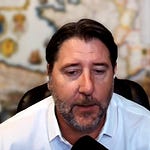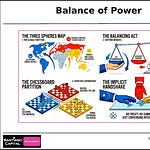In a fiery debate hosted by Dave Collum, two economic heavyweights – Peter Schiff and Brent Johnson – squared off on Donald Trump's trade policies, tariffs, and the broader implications for the U.S. economy.
Schiff, the outspoken gold bug and critic of government intervention, lambasted tariffs as a self-inflicted wound on American consumers. Johnson, a pragmatic market strategist, acknowledged the flaws but argued they're an unavoidable reality in a world far from free-market ideals.
What unfolded was a masterclass in economic philosophy, peppered with sharp jabs, historical analogies, and dire warnings about the dollar's fate.
But as the dust settles, one question lingers: Could these tariffs spark a manufacturing renaissance, or are they a ticking time bomb for inflation and job losses?
The Tariff Trap: Symptom or Cure?
Peter Schiff kicked things off with a blistering critique, calling Trump's tariffs "misguided" and focused on symptoms rather than root causes.
For over 40 years, America's massive trade deficits have stemmed not from foreign tariffs – which he notes are generally low – but from an uncompetitive economy.
Industries once dominated by the U.S. have vanished, and Americans flock to cheaper, higher-quality imports from Asia, Europe, and beyond.
"Even with shipping costs, it's still a better deal," Schiff argued.
Tariffs, in his view, won't magically resurrect factories; they require massive capital investments that no one will make if the next administration could scrap the protections.
Worse, tariffs act like a boomerang, harming domestic manufacturers who rely on imported components.
With steel tariffs at 50%, U.S. assemblers face higher costs than foreign competitors buying tariff-free.
Schiff dismissed Trump's claim that foreigners pay the tariffs as "just not true" – they're a consumption tax borne by American importers and, ultimately, consumers.
He even called them unconstitutional, insisting revenue-raising measures must originate in the House for accountability.
"We're going to lose the trade war because we don't have weapons to fight it," he warned.
Brent Johnson, while philosophically aligned with Schiff as a free-market advocate, painted a starkly different picture of reality.
In a perfect world, markets would rule, but history shows mercantilism and tariffs as the norm for centuries – free trade is the anomaly of the last 50-75 years.
"It can work because it has worked," Johnson countered, though perhaps less efficiently.
He sidestepped the good-vs-bad debate, focusing instead on inevitability: Tariffs are coming, backed by political winds and global discontent.
Trump's election reflected middle-class rage over jobs shipped overseas, and similar frustrations bubble in Europe, Japan, and China.
"Blame the evil foreigners" is an age-old political ploy, and democracy demands action.
But here's the hook that kept the debate sizzling: If tariffs are so destructive, why do countries worldwide cling to them? And could they actually lure factories back to America, or will they just inflate prices without delivering jobs?
Who Really Pays? The Great Tax Shuffle
Host Dave Collum prodded the duo on the tariff "taxpayers": exporter, importer, or consumer?
Schiff doubled down on reality trumping theory.
Exporters won't sell at a loss; if margins are slim (5-10%), they'll pass costs on or find other markets.
Even high-margin producers won't absorb hits if better opportunities exist elsewhere – and with billions of global consumers, alternatives abound.
He flipped Trump's narrative: Trade deficits prove America exploits the world, swapping printed dollars for real goods.
"We screw over the world," Schiff quipped, but that "privilege" is eroding as dollar confidence wanes, evidenced by gold at $3,500.
Johnson pushed back with real-world examples.
Europe and Japan signed new trade deals on worse terms post-tariffs – why, if they could easily pivot?
Because U.S. markets are irreplaceable for profitability; without them, debts incurred for production can't be serviced.
He likened tariffs to a Vegas velvet rope: Charge more, and demand surges if it's "the place to be."
America, as the world's biggest customer, holds leverage.
Yet he conceded blowback: Higher prices initially, but potential for competitive U.S. production and stronger wages.
The exchange veered into democracy's pitfalls – Schiff decries it as mob rule, favoring a republic – and timescales.
Companies promise factories (like Apple's multi-billion-dollar plants) but delay shovels for years.
Schiff saw empty boasts; Johnson predicted eventual congressional backing.
But amid the barbs, a provocative query emerged: What if the dollar suddenly halved in value – would America still outbid the world, or would a weaker currency unleash global prosperity at our expense?
Dollar Doomsday: Crisis or Milkshake?
Hypotheticals flew as the debate drilled into the dollar's future.
Schiff envisioned a halved dollar index (from ~98 to 45) impoverishing Americans while enriching others – cheaper oil and commodities for foreigners, pricier imports for us.
"Production creates demand," he stressed; America's overvalued dollar and easy credit fuel artificial consumption. Johnson dismissed it as "cow jumping over the moon" fantasy, arguing such a plunge would bankrupt the world, given $100+ trillion in dollar-denominated debt.
Scaling back to a realistic 10-15% drop over 1-2 years, Johnson explained mechanics: Massive U.S. credit extension provides liquidity, weakening the dollar short-term, but maturities trigger demand spikes, rocketing it higher (as in 2022's climb to 113). De-dollarization? It's rhetoric; crises force dollar reliance.
Schiff countered: Fiscal mistrust and Fed independence erosion could flood markets with unwanted dollars from trade partners, collapsing value without new credit.
Collum steered to inflation's bite – COVID-era price surges crushing paychecks.
Johnson tied it to forex mismatches in a debt-based system: Carry trades unravel, sparking crises (2008, 2020).
"It matters because the dollar underlies everything." Schiff predicted the next crisis targets the dollar itself, driving flight to gold, not strength.
But with $100T in Eurodollar credit, Johnson asked: How do debtors sell dollars they need for repayment?
Schiff: Borrowers earn excess, repay minimally, and dump the rest; lenders sell too.
The real zinger? If the dollar's the "cleanest dirty shirt," why bet against it? And could gold dethrone it entirely, reshaping global reserves?
Gold's Glow and Market Mayhem
Gold loomed large, with Schiff hailing it as the dollar's nemesis.
Central banks hoard it, reserves hitting highs; it's the ultimate alternative, free from U.S. sanctions.
"The next reserve is gold," he declared, backing currencies like the yuan better than dollars.
Johnson agreed on gold's rise but noted it hurts all fiats relatively – the U.S., as reserve holder, loses most, but remains top dog.
Stock markets? Overvalued at 200% historical averages, per Collum.
Johnson eyed a potential 10-20% correction by September/October, paving way for Fed easing and Trump control.
Passive flows (401ks) drive irrational highs; reversals from layoffs or recessions could tank them.
Schiff urged ditching U.S. stocks for foreign ones (up 40% YTD in his fund) and gold miners (up 90%, still cheap). "Buy gold while it's in the ground."
But as governments meddle – tariffs for security, not economics – Johnson warned: This is Game of Thrones, not textbook theory. Trump aims for hegemony; failure spells global disaster. Schiff: Government goals backfire; expect opposite outcomes.
In the end, tariffs may shield sovereignty but at what cost? As prices rise and dollars wobble, will you hedge with gold, go global, or bet on America's grit?
The debate leaves us pondering: In this economic cage match, who really wins – and is the fight just beginning?











